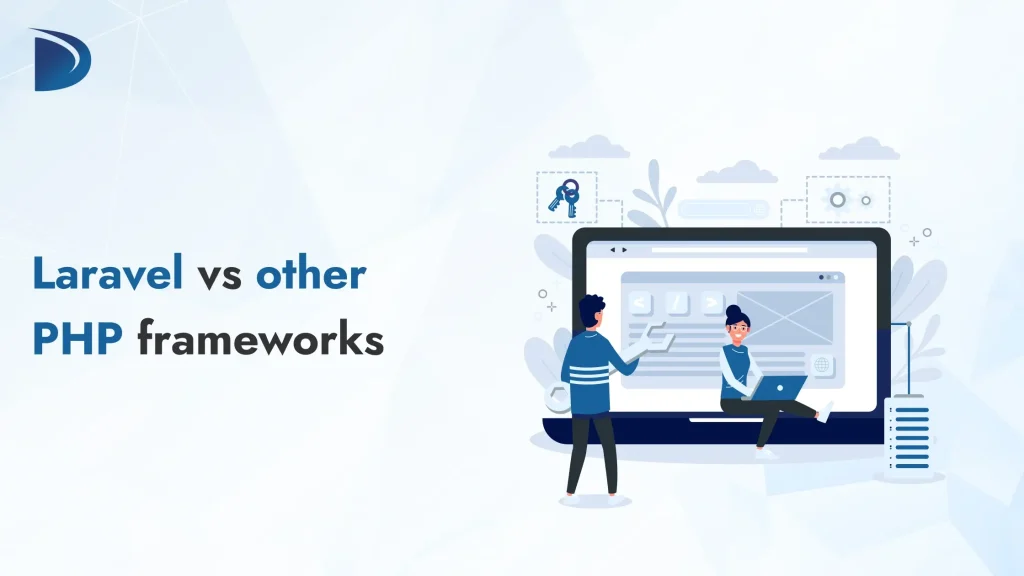Table of Contents
Choosing the right PHP framework is one of the most important decisions when developing web applications. The right framework not only affects the timeline of your project, but also scalability, security, performance and long-term maintenance. Among all the options, Laravel, Symfony and CodeIgniter are among the most commonly used PHP frameworks today.
In this guide, we’ll go over the pros and cons of each framework and how they perform in real-world use cases. If you want to create a scalable and maintainable application, this comparison will make your decision easier.
Are you ready to get started? Partner with a trusted Laravel web development company to get expert services from day one.
What is a PHP framework?
A PHP framework is a collection of pre-built code that helps developers build web applications more efficiently. Frameworks structure your code, provide built-in functions and save you from having to write everything from scratch.
Why use a PHP framework?
- Faster development
- Better security
- Built-in tools and libraries
- Clean, reusable code
- Easier maintenance
Now let’s see what sets Laravel apart and how it compares to others.
What is Laravel?
Laravel is a full-stack PHP framework known for its elegant syntax, powerful features and developer-friendliness. With built-in support for MVC architecture, Eloquent ORM, Blade Templating Engine and Artisan CLI, Laravel enables fast development with clean, maintainable code.
Best use cases:
- Complex web applications
- SaaS platforms
- API backends
- Enterprise-grade systems
Key strengths:
- Rich ecosystem (Laravel Nova, Forge, Vapor, Breeze)
- Excellent documentation and community
- Modern PHP practices (queues, events, jobs, broadcasting)
Why Laravel stands out?
- Developer-friendly CLI with Artisan
- Ecosystem integrations like Jetstream, Sanctum and Passport
- Readability and maintainability of the code
Use Laravel when:
- You develop scalable web applications
- You need native API or SPA support
- You want long-term maintainability with an extensive ecosystem
One of the main benefits of Laravel development for startups is its rapid development cycle, which helps small teams launch products quickly with fewer resources.
Laravel vs CodeIgniter
| Feature | Laravel | CodeIgniter |
| Architecture | MVC (built-in) | MVC (lightweight, less enforced) |
| ORM | Eloquent ORM | Manual SQL or third-party ORM |
| Routing | Clean, expressive | Basic, manually configured |
| Security | Built-in CSRF, hashing, encryption | Manual security handling |
| Modern Features | Queues, events, jobs, broadcast | Very limited |
CodeIgniter is an excellent choice for beginners due to its simplicity and ease of use. It doesn’t have many built-in features, which means it’s lightweight and fast. However, it lacks some modern features that Laravel provides out of the box.
When to choose CodeIgniter: If you need a very small or fast-loading app with limited advanced features, CodeIgniter development might be a good choice. But for most modern applications, Laravel is more scalable and future-proof.
Laravel vs Symfony
| Features | Laravel | Symfony |
|---|---|---|
| Learning Curve | Easy to moderate | Steeper due to complexity |
| Performance | High with Laravel Octane | High, great for large enterprise apps |
| Modularity | Opinionated structure | Highly customizable |
| ORM | Eloquent ORM | Doctrine ORM |
| Community | Very large, beginner-friendly | Mature and enterprise-focused |
| Use Cases | Web apps, SaaS, APIs | Enterprise-grade systems, CRMs |
When to choose Symfony?
- You have a team of experienced developers.
- You need extreme flexibility and control.
- You are building a large enterprise system with complex workflows.
Laravel Vs Other Popular PHP Frameworks
Laravel vs. Yii
Yii stands for “Yes, it is!” and is known for high performance and strong security. Yii 2 is the latest stable version, but it’s less popular compared to Laravel today.
Laravel advantages over Yii:
- Cleaner and more readable syntax
- Built-in features such as jobs, queues and events
- Easier testing and debugging
Yii advantages:
- Very fast performance.
- The Gii code generator can speed up scaffolding
- Well suited for large projects with experienced teams
When to choose Yii? If speed is your top priority or you’re working with a team that already has experience with Yii, it’s a solid option. Otherwise, Laravel offers more ease and flexibility.
Laravel vs Zend (Laminas)
Zend Framework has been renamed Laminas and is mainly used for enterprise applications. It was developed with security and performance in mind, but is not beginner-friendly.
Advantages of Laravel over Zend:
- Easier to set up and get started with programming
- More expressive and elegant syntax
- More integrated features for fast development
- Extensive documentation and support from the community
Zend advantages:
- Highly modular and scalable
- Great for long-term enterprise applications
- Built according to strict object-oriented principles
When to choose Zend/Laminas? If you work in a large organization with strict architectural requirements and a team of experienced developers, Zend is a good choice. However, if you want to develop quickly and elegantly, Laravel is the better choice.
Laravel vs Phalcon
- Phalcon is extremely fast (compiled C extension).
- Laravel has better support, a better learning curve and better tools.
These tools, combined with Laravel’s seamless development experience, clearly demonstrate why Laravel is the preferred PHP framework for many modern web developers.
Conclusion
Laravel is the most balanced PHP framework. Laravel offers the perfect balance between performance, scalability, and ease of use. With its active community, modern toolkit, and built-in best practices, Laravel is the ideal choice for start-ups, SMEs, and even large enterprises.
Whether you’re developing a complex SaaS or a custom e-commerce solution, Laravel gives you the tools to move fast without sacrificing code quality.
FAQs
What are the best use cases for Laravel?
Laravel is great for complex web apps, SaaS platforms, API backends, and enterprise-level systems.
What are the key strengths of Laravel?
Laravel has a strong ecosystem (Nova, Forge, Vapor, Breeze), clear documentation, an active community, and modern PHP features like queues, jobs, and events.
Why does Laravel stand out from other frameworks?
It has a developer-friendly CLI (Artisan), easy integrations (Jetstream, Sanctum, Passport), and clean, readable code that is easy to maintain.
When should I use Laravel?
Choose Laravel if you want to build scalable apps, need API or single-page app (SPA) support, or want long-term maintainability with a strong ecosystem.
When should I choose CodeIgniter over Laravel?
If you need a very small, lightweight, and fast app without advanced features, CodeIgniter can work. But for most modern apps, Laravel is better for scalability and future growth.
When should I choose Symfony over Laravel?
Pick Symfony if your team is highly experienced, you need maximum flexibility, and you’re building a very large enterprise system with complex workflows.
When should I choose Yii over Laravel?
Choose Yii if speed is your top priority or your team is already skilled with Yii. Otherwise, Laravel is easier and more flexible.
When should I choose Zend/Laminas over Laravel?
Zend/Laminas is good for big organizations with strict architecture rules and experienced developers. But if you want faster and more elegant development, Laravel is a better option.
How does Laravel compare to Phalcon?
Phalcon is faster because it’s built as a C extension. But Laravel has better support, easier learning, and a richer set of tools.
Why is Laravel considered the best PHP framework?
Laravel balances performance, scalability, and ease of use. With its modern toolkit, strong community, and built-in best practices, it works well for startups, SMEs, and large enterprises. From SaaS apps to e-commerce, Laravel helps developers move fast without losing code quality.
What are the benefits of Laravel for startups?
Laravel allows quick development, helping small teams launch products faster with fewer resources.
Is Laravel better than pure PHP for performance?
Pure PHP may be slightly faster in raw execution, but Laravel offers tools (like Octane) that make apps fast and scalable. Plus, Laravel improves security and speeds up development compared to writing everything from scratch.
How do I get started with Laravel?
Work with an experienced Laravel development company or follow the official documentation. With its strong tools and smooth workflow, Laravel makes web development easier for beginners and professionals alike.

